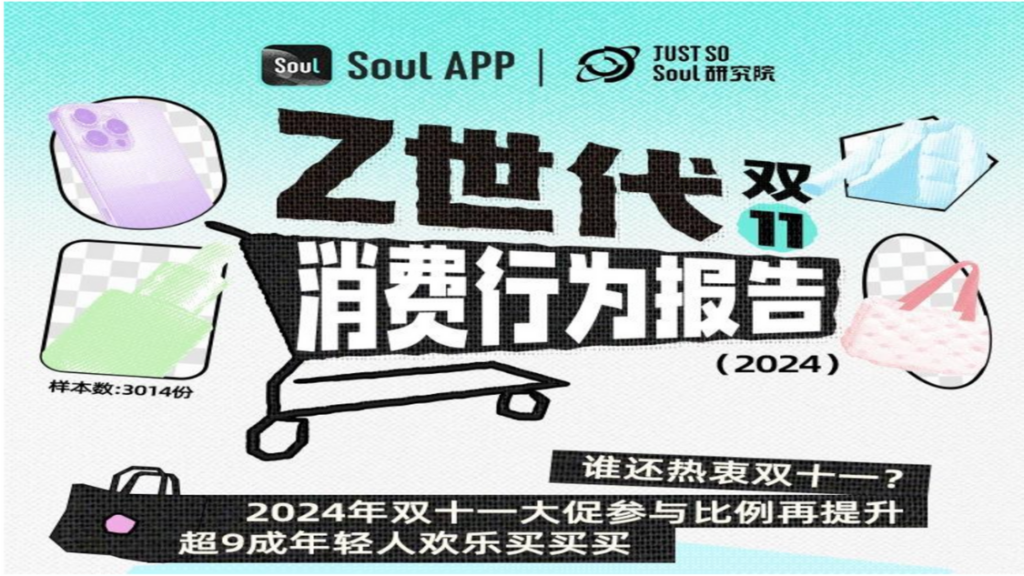
Soul App recently conducted a survey to understand Gen Z’s priorities, shopping choices, and consumption mentality during Double 11. Responses were invited from over 3,000 platform members and the questionnaire was designed to gather the views of youngsters on everything from the duration of the annual shopping festival to the products purchased.
Because this year Single’s Day shopping started well in advance, the festival actually went on for about one month before its culmination on 11.11. Mostly young shoppers held a neutral or positive view of the shopping marathon that the event had turned into.
But, around 16% were none too happy with the extra days. Approximately 40% had a clear agenda and once they had purchased what they wanted, they were out. Over 15% were actually glad to have the extra days as it helped them to make savvy buying decisions without facing the fear of missing out.
Having said that, the overall participation rate in the Double 11 festival of 2024 stood at a staggering 90%, which was definitely higher than that of previous years. In terms of money spent, the scale was almost balanced.
Nearly 35% of Soul App’s survey participants stated that they intended to spend more than last year on their shopping spree in 2024, while around 25% let on that they had brought down their Double 11 budget. The general observation was that Zoomers took a different approach to this annual retail event, prioritizing sustainability, emotional fulfillment, and unique experiences over simply accumulating goods.
According to Soul App’s report, about 60% of Gen Z respondents opted for domestic brands that they associated with sustainability, economic revival, and environmental responsibility. This preference extended to various categories, from beauty and skincare to electronics and home goods.
For instance, local beauty brands such as Proya, known for their sustainability initiatives, grew in popularity among Gen Z, who value brands with ethical practices. This trend demonstrates that the shopping choices made by youngsters during Double 11 went beyond price considerations; they were driven by a desire to support brands that align with their values.
Another hard-to-miss trend that Soul App’s survey highlighted was that of “Happy Consumption.” According to the report, emotional value played a pivotal role in purchasing decisions this year, as more than 40% of the survey participants revealed that they intended to spend on items that bring joy, comfort, or emotional satisfaction.
In other words, the mere idea of accumulating goods and finding the best deals were not the motivating factors during this Double 11. Instead, Gen Z’s spending habits reflected a deeper focus on experiences and personal well-being. Travel experiences, entertainment products and services, and unique collectibles were picked up within minutes of being listed.
All of these purchases had a common factor – they are a source of happiness, nostalgia, or comfort, and by choosing them over other products, Gen Z has made it clear that they want to spend on items that enrich their lives. For retailers, this means that creating products or experiences that connect on a personal level is essential for resonating with young consumers.
While nearly all the major e-commerce platforms had their cash registers ringing throughout the 1-month duration of the festival, surprisingly, offline retailers also drew in the crowds. In fact, more than 44% of those who participated in Soul App’s survey stated that they spent as much offline as they did online.
For Gen Z, the tactile experience of in-store shopping provides a valuable contrast to digital interactions. The fact is that this generation appreciates the ability to touch, try on, and experience products firsthand. Many are willing to support brands with a robust offline presence. Hence, brands that create synergy between online and offline shopping by offering a seamless, hybrid approach, can expect to resonate more with Gen Z.
Soul App’s survey also shed light on the rise of the “He Economy”. Intriguingly, male consumers had greater influence than their female counterparts during Double 11 this year. Gen Z men’s average spending exceeded that of women, with a budget of 4,805 RMB compared to women’s 4,308 RMB. Also, this trend highlighted a rising demand among men for lifestyle and wellness products, traditionally less associated with male consumers.
For example, male spending on medical aesthetics, fitness equipment, and skincare has increased. This shift indicates a broadening of consumer interests among men. It goes without saying that brands need to take note of this change and tailor their offerings to meet the demands of this growing market.
Also, Soul App’s report found that government subsidies in sectors such as home appliances, automobiles, and digital and tech goods had yielded the intended results as they pulled in the buyers. Mostly, these high ticket purchases were made by young men.
All in all, Soul App’s report points to an evolution in what Double 11 stands for and how it is celebrated. The survey clarified that sustainability, emotional value, and experiences are key priorities for youngsters.
The survey conducted by Soul App offered a succinct indication for brands aiming to capture Gen Z’s attention – They will need to shift their focus from merely providing discounts to creating meaningful interactions, supporting ethical practices, and integrating technology to enhance shopping experiences. It is important to remember that the future of retail will be shaped by these values, with Gen Z leading the way in defining a new era of mindful, experience-driven consumerism.










